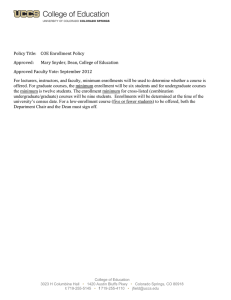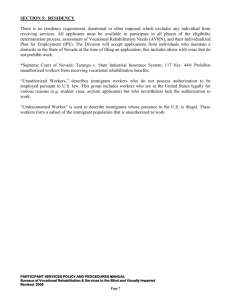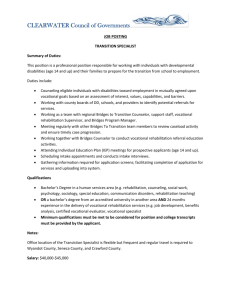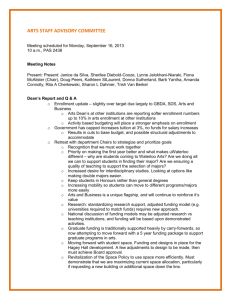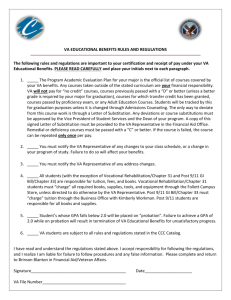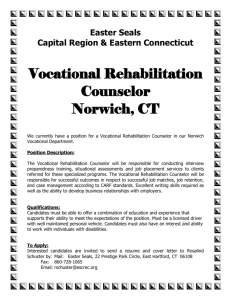Planning and Review Committee Program: B.S. Vocational Rehabilitation
advertisement
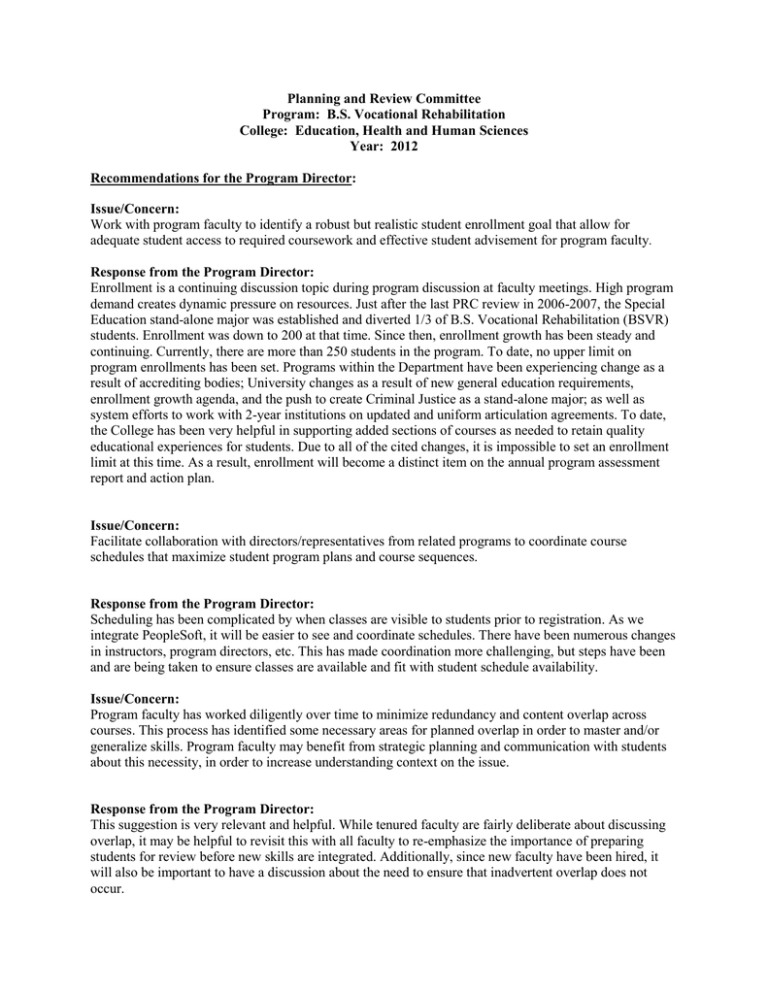
Planning and Review Committee Program: B.S. Vocational Rehabilitation College: Education, Health and Human Sciences Year: 2012 Recommendations for the Program Director: Issue/Concern: Work with program faculty to identify a robust but realistic student enrollment goal that allow for adequate student access to required coursework and effective student advisement for program faculty. Response from the Program Director: Enrollment is a continuing discussion topic during program discussion at faculty meetings. High program demand creates dynamic pressure on resources. Just after the last PRC review in 2006-2007, the Special Education stand-alone major was established and diverted 1/3 of B.S. Vocational Rehabilitation (BSVR) students. Enrollment was down to 200 at that time. Since then, enrollment growth has been steady and continuing. Currently, there are more than 250 students in the program. To date, no upper limit on program enrollments has been set. Programs within the Department have been experiencing change as a result of accrediting bodies; University changes as a result of new general education requirements, enrollment growth agenda, and the push to create Criminal Justice as a stand-alone major; as well as system efforts to work with 2-year institutions on updated and uniform articulation agreements. To date, the College has been very helpful in supporting added sections of courses as needed to retain quality educational experiences for students. Due to all of the cited changes, it is impossible to set an enrollment limit at this time. As a result, enrollment will become a distinct item on the annual program assessment report and action plan. Issue/Concern: Facilitate collaboration with directors/representatives from related programs to coordinate course schedules that maximize student program plans and course sequences. Response from the Program Director: Scheduling has been complicated by when classes are visible to students prior to registration. As we integrate PeopleSoft, it will be easier to see and coordinate schedules. There have been numerous changes in instructors, program directors, etc. This has made coordination more challenging, but steps have been and are being taken to ensure classes are available and fit with student schedule availability. Issue/Concern: Program faculty has worked diligently over time to minimize redundancy and content overlap across courses. This process has identified some necessary areas for planned overlap in order to master and/or generalize skills. Program faculty may benefit from strategic planning and communication with students about this necessity, in order to increase understanding context on the issue. Response from the Program Director: This suggestion is very relevant and helpful. While tenured faculty are fairly deliberate about discussing overlap, it may be helpful to revisit this with all faculty to re-emphasize the importance of preparing students for review before new skills are integrated. Additionally, since new faculty have been hired, it will also be important to have a discussion about the need to ensure that inadvertent overlap does not occur. Issue/Concern: Support program faculty in their continued efforts to increase student professional writing skills. Response from the Program Director: This is an ongoing effort by the Department. Some program faculty have begun to use the CEHSS writing guideline rubric in their classes. A recent program revision added 1 credit to REHAB 398 Field Experience, as it was identified as a writing intensive course. Issue/Concern: Work with program faculty to identify resources to support up-to-date technological resources, lab equipment and related training tools. This may include grant proposals for lab modifications and other related institutional resources. Response from the Program Director: The faculty have gotten considerable support from Access to Learning and College funding to keep materials, technology and equipment up to date. The Department also uses service and supply money to keep up-to-date materials available to students. There continue to be some problems with electrical connections, computer outlets, and teaching stations that are well designed for teaching/learning. The College is working on getting resolution for these problems. Faculty will continue to take advantage of lab modification opportunities in order to stay current. Issue/Concern: Continue to work with institutional departments, including facilities and ADA representatives, to maximize access to relevant campus buildings. Response from the Program Director: Currently, there is one faculty member and student from the undergraduate BSVR program that are serving on the campus ADA committee. Compliance with ADA standards is a major concern for the Department as there are a large number of students with disabilities enrolled in the BSVR program. Some faculty also have extensive experience with the legal standards for accommodations in physical, program, and classroom access and are always willing to lend their experience working with institutional departments. Recommendations for the Department Chair: Issue/Concern: Support the efforts of the BSVR in pursuit of full accreditation from the Commission on Rehabilitation Education (CORE), anticipated Summer of 2012. Response from the Department Chair: As CUE co-chair and as an undergraduate site reviewer for CORE, the Rehabilitation and Counseling Department Chair will continue to facilitate communication with CORE and CUSA on the status of undergraduate accreditation. Recommendations for the Dean: Issue/Concern: College of Education, Health and Human Sciences: Work with the Department and program to identify and secure funding-based opportunities that will assist the B.S. Vocational Rehabilitation program with the updating of its lab-based facilities as well as physical accessibility issues to buildings, consistent with CORE accreditation priorities. Response from the Dean: Associate Dean Bob Peters has been working with the campus physical development, building, and maintenance staff to develop a plan for remodeling the vocational evaluation laboratory, VR 310. A laboratory modernization proposal will be submitted in fall 2012. Other possible sources of funding include small projects, special projects funding and/or college-level funding. CEHHS has also established an annual initiative to solicit proposals for updating research equipment. Rehabilitation and Counseling faculty and staff will be encouraged to submit proposals for updating laboratory equipment. Issue/Concern: School of Education: Support facilitation between BSVR program and Special Education concentration faculty and coursework, accordance with DPI standards, e-portfolio requirements, etc. Response from the Director, SOE: All students enrolled in the B.S. Vocational Rehabilitation, Special Education concentration are carefully monitored by the School of Education to assure consistency with education majors including completion of all SOE benchmark requirements. BS VR/SE concentration students are required to participate in both the BS VR and Special Education advisement activities.
